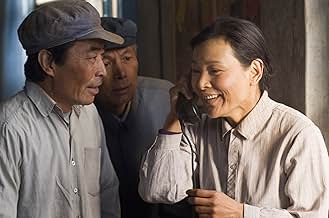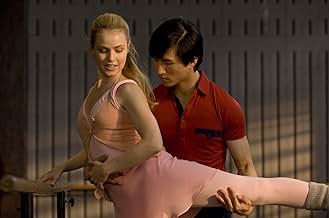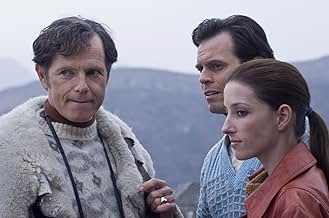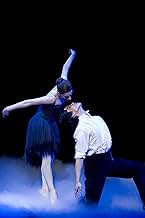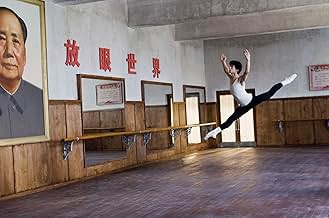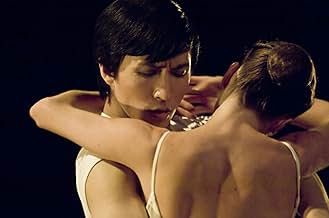PUNTUACIÓN EN IMDb
7,3/10
8,4 mil
TU PUNTUACIÓN
En la China maoísta, separan a un niño de su familia y lo entrenan para convertirse en bailarín, pero todo lo que sabe se ve desafiado cuando lo eligen para asistir a una escuela de verano d... Leer todoEn la China maoísta, separan a un niño de su familia y lo entrenan para convertirse en bailarín, pero todo lo que sabe se ve desafiado cuando lo eligen para asistir a una escuela de verano de ballet en Houston, Texas.En la China maoísta, separan a un niño de su familia y lo entrenan para convertirse en bailarín, pero todo lo que sabe se ve desafiado cuando lo eligen para asistir a una escuela de verano de ballet en Houston, Texas.
- Dirección
- Guión
- Reparto principal
- Premios
- 7 premios y 20 nominaciones en total
Christopher Kirby
- Mason
- (as Chris Kirby)
Reseñas destacadas
Mao's last Dancer tells the true story of Chinese ballet dancer Li Cunxin who grew up in rural poverty in Mao's communist before being given the opportunity to dance in the West in the early 80s. Li is forced to examine his conscience as he must choose between his career, family, culture, politics and love whilst having to make heart-wrenching decisions of what he must choose to sacrifice and what he must choose to save.
Li Cunxin is played magnificently by Chi Cao (as an adult) as well as Chengwu Guo (as a teenager). Chi Cao, a highly recognised ballerino in his own right, must receive the bulk of the accolades for what is truly a seamless breakthrough performance by a first time actor. The rest of the cast are also fantastic including Bruce Greenwood who plays the difficult and complex part of a slightly camp Ballet Director who must confront his own values.
Kyle MacLachlan ("Sex and the City") takes a relatively brief but delightfully forceful turn as a Houston lawyer and Australians will delight in the cameo by the ever wonderful Jack Thompson.
As an Australian production I was extraordinarily proud. Bruce Beresford has produced arguably his finest picture to date (and yes, I've seen "Driving Miss Daisy") as the pacing, musical score, use of ballet on camera and story structure were all pitch perfect. The film jumps around between 80s USA and Li's Chinese upbringing at the beginning before settling into a groove during the middle and end. And just when the film could be in danger of straining it's audience Beresford delivers moments of levity and humour that remind us of the characters' humanity.
The backdrop of politics against which the film plays is neither ignored nor focused on. Had it gone one way or the other, the film wouldn't have worked nearly so well but Beresford dealt with this delicate theme with such craftsmanship that it never becomes an issue for the audience.
Jan Sardi (who also wrote Shine and the Notebook) has also produced a highly commendable script for what must have been a daunting project - given the success of the book the movie is based on.
At 132 minutes, the film is long and this can be felt slightly in the middle. However, the fault is only minor and I defy any viewer to watch this without being moved by Li's story.
Many who have read Li's memoirs (as I have) will be anxious to know whether the movie does the book justice. I'm overjoyed to say that it does. I openly wept several times in the film as did most of the audience members around me. There were a few subplots and parts of the novel left out but I found that, unusually, this didn't bother me as much as it normally does with movies based on true stories.
This is because the film told the essence of Li's story extraordinarily well in this irresistibly moving telling of one man's struggle as he's caught between two cultures at a time of when they were pushing against each other.
This year's Slumdog Millionaire upstart is Mao's Last Dancer.
Li Cunxin is played magnificently by Chi Cao (as an adult) as well as Chengwu Guo (as a teenager). Chi Cao, a highly recognised ballerino in his own right, must receive the bulk of the accolades for what is truly a seamless breakthrough performance by a first time actor. The rest of the cast are also fantastic including Bruce Greenwood who plays the difficult and complex part of a slightly camp Ballet Director who must confront his own values.
Kyle MacLachlan ("Sex and the City") takes a relatively brief but delightfully forceful turn as a Houston lawyer and Australians will delight in the cameo by the ever wonderful Jack Thompson.
As an Australian production I was extraordinarily proud. Bruce Beresford has produced arguably his finest picture to date (and yes, I've seen "Driving Miss Daisy") as the pacing, musical score, use of ballet on camera and story structure were all pitch perfect. The film jumps around between 80s USA and Li's Chinese upbringing at the beginning before settling into a groove during the middle and end. And just when the film could be in danger of straining it's audience Beresford delivers moments of levity and humour that remind us of the characters' humanity.
The backdrop of politics against which the film plays is neither ignored nor focused on. Had it gone one way or the other, the film wouldn't have worked nearly so well but Beresford dealt with this delicate theme with such craftsmanship that it never becomes an issue for the audience.
Jan Sardi (who also wrote Shine and the Notebook) has also produced a highly commendable script for what must have been a daunting project - given the success of the book the movie is based on.
At 132 minutes, the film is long and this can be felt slightly in the middle. However, the fault is only minor and I defy any viewer to watch this without being moved by Li's story.
Many who have read Li's memoirs (as I have) will be anxious to know whether the movie does the book justice. I'm overjoyed to say that it does. I openly wept several times in the film as did most of the audience members around me. There were a few subplots and parts of the novel left out but I found that, unusually, this didn't bother me as much as it normally does with movies based on true stories.
This is because the film told the essence of Li's story extraordinarily well in this irresistibly moving telling of one man's struggle as he's caught between two cultures at a time of when they were pushing against each other.
This year's Slumdog Millionaire upstart is Mao's Last Dancer.
My husband and I went to see this movie yesterday and thought the acting was great from relatively unknown, at least to us, actors. I had some idea of what the movie was about prior to going to see it but it was even better than my expectations, and the lead actor was a truly magnificent dancer, as were the others.
The story was moving with a few humorous moments, and showed how disciplined a person must be in order to become a great dancer. I have to say it has been my experience that people generally leave before the credits but, like myself, they stayed, which says something for the acting and the movie itself.
I would recommend this movie to everyone, even those who are not fans of ballet.
The story was moving with a few humorous moments, and showed how disciplined a person must be in order to become a great dancer. I have to say it has been my experience that people generally leave before the credits but, like myself, they stayed, which says something for the acting and the movie itself.
I would recommend this movie to everyone, even those who are not fans of ballet.
One clever element of this film is the way in which various people who are significant in Li Cunxin's life, tell him stories with a message. The frog trapped at the bottom of a well is one. He hears from a toad at the top of the well that the big wide world is worth seeing.
The whole film is a story with a message - and the message is one that uplifts without in any sense being cloying. Beresford, the director, even manages at several stages to invoke the idiom of Chinese revolutionary film and theatre. The scenes actually shot in China are some of the most authentic in the film, which is not uniformly good in this regard. Somehow, the slightly stagy acting of some of the Huston Ballet Company characters, ceases to matter because the lead parts are well carried and the storyline is strong.
Li Cunxin defected to America partly for his art and partly for love. The wonders of the materiality of Huston are perhaps a poor substitute for losing your country; yet that country was deeply scarred by the Mao's cultural revolution. To watch the part early on where the benefits brought by Chairman Mao to the Chinese people, are laid out by Party Functionaries, has a dark poignancy, given that today we know he was directly responsible for the death of many, many millions.
The dance sequences are done very well and the film pleases at that level as well as a tale with more twists and turns than you might imagine.
A film of some subtlety and considerable beauty; recommended.
The whole film is a story with a message - and the message is one that uplifts without in any sense being cloying. Beresford, the director, even manages at several stages to invoke the idiom of Chinese revolutionary film and theatre. The scenes actually shot in China are some of the most authentic in the film, which is not uniformly good in this regard. Somehow, the slightly stagy acting of some of the Huston Ballet Company characters, ceases to matter because the lead parts are well carried and the storyline is strong.
Li Cunxin defected to America partly for his art and partly for love. The wonders of the materiality of Huston are perhaps a poor substitute for losing your country; yet that country was deeply scarred by the Mao's cultural revolution. To watch the part early on where the benefits brought by Chairman Mao to the Chinese people, are laid out by Party Functionaries, has a dark poignancy, given that today we know he was directly responsible for the death of many, many millions.
The dance sequences are done very well and the film pleases at that level as well as a tale with more twists and turns than you might imagine.
A film of some subtlety and considerable beauty; recommended.
In a village of China, the eleven year-old Li Cunxin is selected by the Comunist Party to study ballet at the Madame Mao's Dance Academy in Beijing. Years later, he travels to Houston in a cultural exchange program invited by the artistic director Ben Stevenson (Bruce Greenwood) and he is promoted to principal dancer of the Houston Ballet. Meanwhile he secretly dates and falls in love with the dancer Elizabeth Mackey (Amanda Schull).
When the China's government asks Li Cunxin (Chi Cao) to return to his country, he marries Liz and defects to USA. He is forbidden to return to China and has no news of his parents and family. Meanwhile, his marriage with Liz ends and he misses his parents. But five years later, he has a great surprise during a performance.
"Mao's Last Dancer" is a film about the true story of the Chinese ballet dancer Li Cunxin. The engaging biography of Li Cunxin is an example of discipline and strength associated with courage to make the right decisions, and it is amazing how a boy from a poor village in China could have become a great ballerino in the West.
Bruce Greenwood, Kyle MacLachlan and Joan Chen are well known actors and are fantastic, but Chi Cao, Chengwu Guo and the rest of the cast and dancers have also top-notch performances. Everything is perfect in this film, from the direction of Bruce Beresford to the cinematography and art direction. My vote is ten.
Title (Brazil): "O Último Bailarino de Mao" ("The Last Ballerino of Mao")
When the China's government asks Li Cunxin (Chi Cao) to return to his country, he marries Liz and defects to USA. He is forbidden to return to China and has no news of his parents and family. Meanwhile, his marriage with Liz ends and he misses his parents. But five years later, he has a great surprise during a performance.
"Mao's Last Dancer" is a film about the true story of the Chinese ballet dancer Li Cunxin. The engaging biography of Li Cunxin is an example of discipline and strength associated with courage to make the right decisions, and it is amazing how a boy from a poor village in China could have become a great ballerino in the West.
Bruce Greenwood, Kyle MacLachlan and Joan Chen are well known actors and are fantastic, but Chi Cao, Chengwu Guo and the rest of the cast and dancers have also top-notch performances. Everything is perfect in this film, from the direction of Bruce Beresford to the cinematography and art direction. My vote is ten.
Title (Brazil): "O Último Bailarino de Mao" ("The Last Ballerino of Mao")
A charming, stirring, visually and emotionally stirring film. The best I've thus far seen in '10. The story of a mainland Chinese 11 year old boy,supposedly forever indoctrinated by daily school- taught commie propaganda garbage,is chosen to attend a special school to be trained for ballet. He does well and in due time, is sent to the USA to the Houston Ballet Company. Then and there he awakens to not only his manhood but to the realization that all he's been taught about the "glory of Chairman Mao's communist revolution, was the furthest thing from the truth. Not only is the lead a wonderful danseur but his acting ability could win him a Best Actor nomination as well. A film NOT TO BE MISSED.
¿Sabías que...?
- PifiasWhen Liz is leaving for San Francisco, She is driving out of the street. In the corner, it is obvious in the corner there is a street post saying "Darling St." in Sydney, with the City of Sydney logo on it. This scene is played in Houston.
- Citas
Li - as an adult: Ben not understand. He's too much in love with China
- ConexionesFeatured in Huckabee: Episodio fechado 25 septiembre 2010 (2010)
- Banda sonoraThe East Is Red
Written by Li You Yuan and Li Huna Zhi
Selecciones populares
Inicia sesión para calificar y añadir a tu lista para recibir recomendaciones personalizadas
Detalles
- Fecha de lanzamiento
- País de origen
- Idiomas
- Títulos en diferentes países
- L'últim ballarí de Mao
- Localizaciones del rodaje
- Houston, Texas, Estados Unidos(Downtown, and Galleria, opening scenes)
- Empresa productora
- Ver más compañías en los créditos en IMDbPro
Taquilla
- Recaudación en Estados Unidos y Canadá
- 4.817.770 US$
- Fin de semana de estreno en EE. UU. y Canadá
- 199.657 US$
- 22 ago 2010
- Recaudación en todo el mundo
- 23.914.731 US$
- Duración1 hora 57 minutos
- Color
- Mezcla de sonido
- Relación de aspecto
- 1.85 : 1
Contribuir a esta página
Sugerir un cambio o añadir el contenido que falta

Principal laguna de datos
What is the French language plot outline for El último bailarín de Mao (2009)?
Responde






